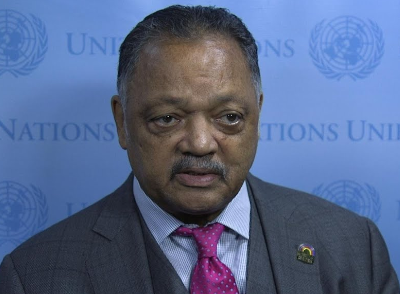Photos: YouTube
Rev. Jesse Jackson delivers the following Christmas message on this challenging Christmas of 2020.
On Friday, millions of people across the world will celebrate Christmas. Here and abroad, safety — staying home, social distancing, wearing masks, being sensible — requires limits on the gatherings and parties. Yet the bells still ring, music is in the air, lights on homes and lampposts shine, blessings are shared.
For so many, this holiday is a difficult time: the cold and hungry, those separated from families, those alone or imprisoned or sick. With the pandemic raging and millions unemployed and on the verge of eviction, this Christmas will witness tears among the smiles.
Each year at this time, I use this column to remind us of the true meaning of Christmas.
Christmas is literally the mass for Christ, marking the birth of Jesus. He was born under occupation. Joseph and Mary were ordered to go far from home to register with authorities. The innkeeper told Joseph there was no room at the inn. Jesus was born on a cold night in a stable, lying in a manger, an “at risk baby.” His earthly father was a carpenter, not a prince or a banker.
Jesus was born at a time of great misery and turmoil, with his country under Roman occupation. Prophets predicted that a new Messiah was coming — a King of Kings — who would rout the occupiers and free the people.
Many expected a mighty warrior, like the superheroes of today’s movies, who would mobilize an army to defeat Rome’s legions. Fearing the prophecy, the Roman King Herod ordered the “massacre of the innocents,” the slaughter of all boys two and under in Bethlehem and the nearby region.
Jesus confounded both Herod’s fears and the peoples’ fantasies. He was a man of peace, not of war. He gathered disciples, not soldiers. He began his ministry by quoting Isaiah 62:1: “The Lord has anointed me to bring good news to the poor.” We will be judged, he taught us, by how we treat “the least of these,” by how we treat the stranger on the Jericho Road. He called us on to feed the hungry, to clothe the naked, to care for the sick, to offer aid to the refugee.
Jesus was the great liberator, but by his words and example, not by his sword. He converted rather than conquered. He accumulated no worldly wealth. He threw the moneylenders from the temple. He owned no home, no land, and had no regular paycheck. His time with us was too brief, and he was crucified for his ministry.
And yet, Jesus succeeded beyond all expectation to transform the world. The Prince of Peace, he taught us that peace is not the absence of violence; it is the presence of justice and righteousness.
These days, Christmas too often becomes a stressful holiday rather than a prayerful holy day. It is a time of sales, shopping and Santa. Yet Jesus taught us to focus on the most vulnerable among us.
This is even more vital today. Poverty is rising, not falling. Food kitchens are overwhelmed. Millions of hard-working people have lost their jobs through no fault of their own. Millions more are deemed “essential workers,” risking their lives for us, yet many receive the lowest pay and the fewest benefits.
And at the same time, the economy is rigged so that the very richest — the billionaires in America — have added over a trillion dollars to their fortunes in the midst of the pandemic.
Jesus praised the Good Samaritan who cared for the stranger on the Jericho Road. Yet today, racial inequities — too often structured into our institutions — continue to cost lives and waste futures. Demagogues fuel fears and hatreds of the other; harsh immigration policies — separating children from their mothers in the extreme — violate our own values. We continue to lock up more people than any nation in the world.
Ignoring the climate crisis that increasingly threatens all of God’s creation now costs us daily in lives, in the destructions of extreme weather, in economic disruptions that already generate millions of refugees.
In this secular age, let us remember the message of Christmas. Jesus demonstrated the astonishing power of faith, hope and charity, the importance of love. He showed that people of conscience can make a difference, even against the most powerful oppressor. He demonstrated the strength of summoning our better angels, rather than rousing our fears or feeding our divisions. This Christmas, this surely is a message to remember.
Merry Christmas, everybody.







